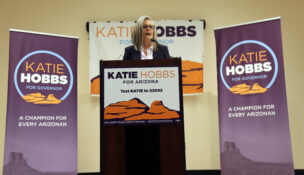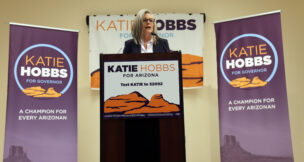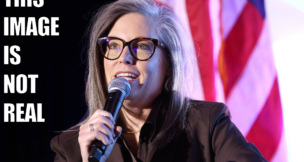New law requires age verification for adult websites in Arizona
Howard Fischer, Capitol Media Services//September 22, 2025//
New law requires age verification for adult websites in Arizona
Howard Fischer, Capitol Media Services//September 22, 2025//
Key Points:
-
New Arizona law requires age verification for online pornography access
-
Publishers must set up digital identification or commercial age-verification systems
-
Lawmakers say the legislation adds one extra layer of protection for children online
Come Sept. 26, accessing pornography online is going to be the same as buying cigarettes, liquor and lottery tickets — you’re going to have to prove you’re old enough.
A new law taking effect on Friday will require any publisher of material “harmful to minors” to set up a system of digital identification or commercial age-verification before access can be granted. The measure has teeth, allowing parents to seek $10,000-a-day penalties from publishers that don’t comply.
And that’s just part of it. The new law says a court can impose a fine of up to $250,000 if the failure to use age verification actually results in one or more minors — defined in the bill as younger than 18 — gaining access to the forbidden materials.
Lawmakers approved the measure despite constitutional concerns, including whether having to upload a picture of yourself along with government ID — one of the verification methods — could lead to identity theft despite provisions in the law that say web sites have to discard the information after verifying someone’s age.
And then there’s the question of infringing on the rights of adults who are legally entitled to view what the bill considers off-limits to minors.
But those appear, at least for the time being, to be moot: After Arizona’s bill was signed into law by Gov. Katie Hobbs, the U.S. Supreme Court said Texas can enforce a similar statute.
A spokesman for Aylo, the owner of PornHub, one of the most-visited web sites for pornographic material, said his company will block its services in the state when the new law kicks in. He said what the law requires is not only ineffective but also intrusive, arguing adult sites will “collect significant amounts of highly sensitive personal information, putting user safety in jeopardy.”
That announcement did not bother Rep. Nick Kupper, the Surprise Republican who crafted the legislation that takes effect Friday.
“Our children and grandchildren will now have slightly safer childhoods,” he said.
Still, there is a technical workaround for Arizonans who like the site.
Central to the legislation is the argument that the system in place now to restrict access to adults — to the extent it can be called a “system” — isn’t sufficient to keep a child with a computer, tablet or a cell phone from accessing pretty much anything.
Put simply, said Kupper, anyone currently going to a website with images of nudity or sex acts is not precisely screened.
“If a minor child, let’s assume a 13-year-old child for instance, goes to a pornography website, it simply asks, ‘Are you 18?”’ he said. “If a child has made it to a pornography website, they’re not going to be stopped by a question.”
So, what kind of age verification will replace the existing systems?
One option under the new law is to upload a copy of government-issued identification, like a driver’s license or passport. That could also require a live “selfie” of the person at the computer to ensure it matches the documents.
The measure also allows websites to use a “commercially reasonable method” that can verify someone’s age, perhaps through a link to a credit card, mortgage documents or education and employment records.
In fact, there already are some companies advertising their ability to do that. And they even are offering “facial age recognition,” using technology to determine whether a person seeking access appears to be at least 18.
All that raises concerns about whether these websites will store such information. Kupper inserted a provision into the new law stating that these companies cannot retain the data and must impose $10,000 fines for passing any of this on to any federal, state, or local government entity.
But the measure drew opposition.
“We support age verification,” said Michael Stabile, who represents the Free Speech Coalition, the organization that represents what it calls the “adult entertainment industry.” “We don’t want minors on our sites.”
But Stabile told lawmakers this isn’t the way to do it.
One big problem, he said, is that the internet is worldwide. And that means there are websites outside of the United States that don’t — and won’t — comply with any domestic laws about screening for minors.
What that leaves, Stabile said, are those U.S. firms that are attempting to comply. But he said what they found is that the adults — who are legally entitled to access what the sites are offering — opt not to go through the hassle of age verification and choose to find those other sites.
One reason users can do that is because the new Arizona law, similar to what has been approved in other states, specifically says that the responsibility to screen for minors falls only to the website hosting the content. There is no responsibility for checking the age of users on the part of internet service providers, web browsers, search engines, or cloud service providers that transmit materials between the originating site and the customer.
The better alternative, Stabile said, is putting age-verification into computers and cell phones.
In essence, it would be up to the adults providing the equipment to youngsters to install and activate features that allow for content filtering.
“You verify once on your device,” he said.
“It knows who you are,” Stabile explained. More to the point, it blocks access to inappropriate materials “whether or not that site is in the Netherlands or whether or not the site is in Arizona.”
He said it’s also more acceptable to the adults who are legally entitled to access the material.
“There are far fewer issues in terms of getting consumers to upload their ID because they’re not uploading it every time they’re going to an adult site,” Stabile said. “They’re not having to scan their face 15,000 times a year.”
Rep. Lupe Contreras said that makes sense to him. In fact, the Avondale Democrat said he and his wife have already placed parental controls on all of their children’s devices.
“We’re always aware of what’s going on on a daily basis,” he said. “We check their devices and we talk to our kids.”
What this bill amounts to, Contreras said, is “government overstepping.”
Kupper told colleagues that device-specific protections only go so far.
“It doesn’t protect if the minor goes to another kid’s house where they don’t have their devices protected in this manner,” he said.
He acknowledged there are other weaknesses in the system, including the use of VPNs — virtual private networks — which can hide a user’s location by routing internet traffic through a remote server in another state.
“Kids are creative,” Kupper said. “And there will be some kids who get past the system.”
Kupper added that the legislation should not be seen as a cure all but as one added layer of protection.
It’s not unlike the “Swiss cheese management” system he learned in the Air Force.
“There’s going to be holes in it,” Kupper explained. “The hope is that you have enough layers of protection in the Swiss cheese that the holes don’t line up.”
There are other concerns, including where the line is drawn on what content would require producing proof of being 18 or over.
It starts with the law saying it applies to “sexual material that is harmful to minors.”
That, in turn, leads to a complex definition including whether the average person, applying contemporary community standards, would find the material as a whole and with respect to minors, is designed to appeal to “prurient interest.”
But it also gets into specifics, saying the definition includes depictions — whether actual, simulated or animated — of pubic hair, genitals, anus or the nipple of a female breast. Then there is the typical list of off-limits sexual activities that cannot be displayed.
And all that, in turn, is subject to the test of whether taken as a whole, it “lacks serious literary, artistic, political or scientific value for minors.”
Marilyn Rodriguez, a lobbyist for the American Civil Liberties Union, said she fears the way the bill is crafted would deny access to information about LGBTQ issues, sexually transmitted diseases and even domestic violence.
Kupper, however, said there’s a feature in his bill that doesn’t exist elsewhere: Its provision giving the right to sue to parents and not to the government when a child accesses a site with no protections.
Consider, he said, what happens if a child accesses a site on transgender education that a parent does not consider to be appropriate and believes runs afoul of the new law.
“You get to take it to court,” Kupper said. At that point, it will be up to a judge to decide if what’s on the site fits the definition of “harmful to minors,” or is legally acceptable.
“We, as the government, are not making that call,” he said.
Kupper also noted that the law mandating ID affects only websites where more than a third of their content is sexual material harmful to minors. He said that provides a lot of latitude to otherwise educational websites, which might also have some material that fits the definition.
Less clear is how much effect the measure and its new identification hurdles may have on the ability of adults in Arizona to access sites they are legally entitled to visit.
Kupper said the Arizona law was modeled after what was approved in Texas, the law that the U.S. Supreme Court ultimately allowed to be enforced. What happened there is that PornHub disabled access to its service to anyone logging in from Texas.
That, however, gets to the issue of a workaround.
Following what happened in Texas, Cybernews.com put up detailed instructions for how residents of that state can obtain VPN service, install the software, create an account, and connect to a server outside of the state, all of which it says will allow residents to continue to access the site. That same option remains for Arizonans who want to browse PornHub without providing age verification.
While all but two Arizona Democratic lawmakers voted against the final bill, it did get the approval of Democratic Gov. Katie Hobbs.
What makes that noteworthy is that Hobbs had vetoed a nearly identical bill the year before, saying that, while she wants children protected, it “should be bipartisan and work within the bounds of the First Amendment, which this bill does not.”
So what changed this year? The governor said it was due to feedback.
“I heard from parents across the state about their concerns about the harm caused by materials that children are exposed to online,” Hobbs said.
As to the comparison of having to present ID to buy cigarettes, alcohol or lottery tickets, there actually is one notable difference. You have to be 21 to do any of those in Arizona. But sexual websites would remain available to those 18 and older — with proper identification.














































